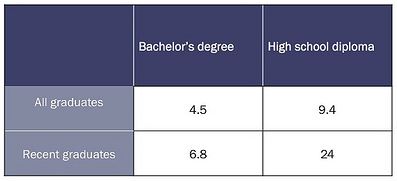While recent college graduates have a higher unemployment rate than graduates overall, they still do better than those with high school diplomas.
But with decreasing government support for higher education, student loan debt is growing quickly and now exceeds one trillion dollars--more than credit card debt. College graduates in 2010 averaged $24,962 in outstanding loans.
So college pays--eventually--but choose wisely. For-profit schools get up to 90% of their revenue from student financial aid and less than half of those students earn a degree.
Update (May 17, 2013): Joseph Stiglitz writes about the crisis of student debt.
Update (June 30, 2013): Tim Donovan suggests that additional earnings from a college degree are overstated. Increasingly, prospective students are faced with a choice of taking on enormous debt for a degree where the prospects for cognitive work are diminishing or foregoing college to compete with recent graduates for the available low skill jobs.
Update (July 17, 2013): Despite rising costs and massive debt, there is a relationship between education and employment.
Update (July 26, 2013): College enrollments declined by two percent last year and are expected to continue to decline.
Update (August 22, 2013): Matt Taibbi writes about the college loan scandal and the high cost of higher education. Also, David Sirota calls for free post-secondary education. From Taibbi:
So, yes, a college education is a great thing, and you probably need one now more than ever--the problem is that it may very well be mandatory, may have less of a chance of ever getting you a job, and you may still be paying for it on your deathbed no matter what.Update (August 23, 2013): President Obama has a proposal to rank colleges in ways to try to reduce costs.
Update (August 30, 2013): David Sirota describes higher education as a lifetime sentence of debt.
Update (September 6, 2013): Mike Konczal offers some thoughts about the cost containment proposals in Obama's plan.
Update (September 8, 2013): Banks are pulling out of the student loan market.
Update (September 16, 2013): David Sirota explains the Pay It Forward plan in Oregon.
Update (December 5, 2013): Seventy-one percent of college graduates have student loans and the average debt is now nearly $30,000.
Update (February 22, 2014): Matthew Saccaro argues that massive debt and poor quality make attending college the worst decision a young person can make.
Update (March 19, 2014): Hannah Gold reports that the average student loan for an American 25-year-old has risen 91 percent in the past ten years. She also reviews Creditocracy And The Case For Debt Refusal by Andrew Ross.
Update (March 25, 2014): The increasing cost of graduate school is driving up student debt.
Update (April 8, 2014): Parents struggle to repay college loans.
Update (June 9, 2014): President Obama announces executive action on student loans including capping loan payments at 10 percent of income.
Update (June 16, 2014): A discussion about making higher education free.
Update (June 20, 2014): David Dayen calls for eliminating student loan servicer middlemen.
Update (September 17, 2014): Strike Debt is using the Rolling Jubilee fund to buy delinquent student debt and cancel it. $3.9 million of debt was bought for $107,000.
Update (October 19, 2014): Kyle Schmidlin calls for debt refusal.
Update (December 15, 2014): A Brookings Institution report shows that 51 percent of first year college students underestimate the amount of debt they are taking on.
Update (January 10, 2015): President Obama has a proposal to make attending community colleges free.
Update (December 12, 2015): Joseph Pomianowski says students need a bailout.
Update (June 1, 2016): A study published by the National Bureau of Economic Research finds that for-profit universities are a bad investment if you don't graduate. And most students at those schools don't.
[O]n average associate’s and bachelor’s degree students experience a decline in earnings after attendance, relative to their own earnings in years prior to attendance. Master’s degree students and students who complete their degrees appear to experience better outcomes, with positive earnings effects.Update (June 24, 2019): Senator Bernie Sanders proposes cancelling all student debt.
Update (September 16, 2020): Mary Green Swig, Steven L. Swig, David A. Bergeron and Richard J. Eskow give a history of student loan debt.
It is time to recognize that the cruel experiment in financing higher education through student loans has failed. It has captured 46 million people and their families in a student loan trap.
It’s time to restore funds for higher education and cancel student debt for the victims of this failed experiment.



No comments:
Post a Comment
Note: Only a member of this blog may post a comment.